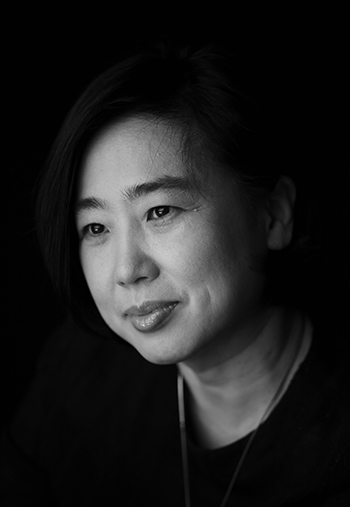
Every Wednesday, JoongAng Ilbo publishes a column on their 30th page. Loved by many readers for her great insight, Education graduate Yang Sun-hee currently works as an editorial writer of JoongAng Ilbo, where she started off as an intern reporter in 1990. Various experiences have made her who she is now, the editorial writer.
Yang is not only an editorial writer but also a novelist with 10 years of experience in literary writing. Her works include Yeo-ryu(予流) Records of Three Kingdoms published in 2013 with Chinese characters meaning “flow of myself,” the first Records of Three Kingdoms written by a female novelist. Yang has also written several more creative novels.
“I have published several novels, although they are not well-known to the public now,” Yang said. “However, writing novels will be my lifelong work that I love to do.”
Writing novels freely at home without doing anything is something that she wishes to do in the future.
“Thinking back on my experiences as a Ewha student, I remember myself as a stay-at-the-library student and a bookworm,” Yang said. “When I was a sophomore, the library system changed into the current one that allows students to borrow books whenever they want. Before then, students had to reserve books that they wanted to borrow in advance. I think the change was a great opportunity for me to read a wide range of books including those not related to my major.”
Joining JoongAng Ilbo in 1990, Yang has moved around to various departments, reporting local, finance and social news. She had been a field reporter for 20 years and after going through the positions of chief of the financial planning department and the chief online editor, she was offered a senior position as an editorial writer.
“I had a chance to write columns since I was a reporter,” Yang recalled. “I tried my best as usual because it was a task assigned to me. After writing columns for about four years, I was probably recognized as a responsible writer who could write a named column which requires much more responsibility. This transformation from reporter to writer was an exciting experience for me.”
Yang expressed that she was able to easily adjust to her new position. As an editorial writer, she could express herself through words that were familiar to her. As a type of person who prefers to write rather than speak when it comes to conveying important information, the job was like a best-fitting dress.
However, writing an editorial is not just about ability to convey the message or opinions through written words. As her article is published every week, covering what is currently topical is another critical factor.
“I always write about current issues,” Yang remarked. “My editorial is published every Wednesday. So I decide on a topic and prepare a draft usually on Mondays and hand in the manuscript on Tuesdays. Sometimes, there would be some important newsbreak a day before the final print, which prompts me to throw away what I have written and start fresh regarding the new issue.”
Yang also added that as an editor one has to be always on guard against the temptation to become a popular writer.
“If your writing is also generalizing at the expense of accurate observation and precise analysis, it only ends up obscuring the very issue you are dealing with,” she emphasized. “Pointing out the essence of the issue and expressing credible opinion is what writers should be most focused on. Also, we should be ready for nasty comments we get on the writings. That’s why I do not pay much attention to the comments after my writings are published.”
Recently, Yang has written editorials on feminist issues such as abortion and woman leadership. This is not only simply because she is the only female editorial writer at JoongAng Ilbo, but also the only one to bring up the issue with interest. Besides these facts, she believes she has the responsibility to fight for it.
“I feel responsible for enhancing social status of women in the society in a harmonious way,” Yang said. “I think other graduates of Ewha who stepped out into the society in the early 90s, a time considered the starting point of women working in the society, would share similar sentiment.”
Yang pointed out the precious lesson that she learned at Ewha. She said that the school gave her a chance to develop feminist consciousness.
“Although there are several female editorial writers in Korea, there probably won’t be many who continuously write about women while they are not assigned to write feminist issues,” Yang said. “I sometimes ask myself whether I would have been able to focus on such issues if I had graduated from a co-education school, and the answer would probably be ‘no.’ Through lessons at Ewha I had lots of chances to think about feminism and face the related issue more directly.”
Yang also gave advice to Ewha students who wish to work in the press. She recommended students to find a medium that could teach them to be good journalists through training and local experience, and critically judging their aptitude for the career.

